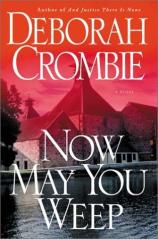Now May You Weep
Review
Now May You Weep
As an American who hasn't been to England, it wouldn't be
appropriate for me to comment on the authenticity of Deborah
Crombie's Duncan Kincaid/Gemma James books. Crombie, a Texan, sets
her series in England and does a lot of work to get it right. My
response to these books is the less critical, more emotional idea
that they just feel right. I hope that doesn't sound facetious; I
have read other mysteries written by Americans that are set in
England and often they don't work.
In the Crombie series, a key issue is the relationship between the
two main characters, both personal and professional, and it has
always seemed to come out of a well-planned story arc. While that's
not exactly true (according to the author, she did not even know
what was to come), this mystery series nevertheless works on many
levels.
In NOW MAY YOU WEEP, the ninth book in the series, Inspector James
is embroiled in a murder that might involve a close friend. She has
traveled to Scotland with her good friend Hazel, who doesn't
explain clearly enough that part of the purpose of the trip is to
see someone she cares about deeply. This is a land of great
distilleries, of both beauty and commerce, of families with long
histories tied to the land. Hazel left years ago and whether she
ran away or escaped depends on who is talking --- but there are
resentments and long-held ties of kinship, friendship and
obligation.
My hesitations about the story may have to do with human nature
more than with fiction. There are too many times in the narrative
where I see smart people doing stupid things or thinking dumb
thoughts --- thoughts on the order of "he'll change his mind, I can
convince him" or "it'll be easy once we just have a chance to
talk." These ideas might work well in romantic fiction but hardly
ever resolve matters as smoothly in real life. I grew impatient
with a husband who assumed that his wife was having an affair based
on little evidence. But maybe he's never known that friendship
between a man and a woman really can exist, without sexual tension.
Maybe I'm the one here who doesn't get it. Spending a few days to
clear up hopes, anticipations, emotions and expectations that have
been around for years seems, well, dumb. And Hazel, whom we've
gotten to know throughout this series, is a relatively smart and
clear-thinking individual. I suppose it could be said that love
makes people stupid, but I have never really bought that ---
hopeful, maybe, but not stupid.
While some mysteries do revolve around obvious red herrings,
they're subtler here. Did Hazel's husband actually come to Scotland
and kill his supposed rival? That seems pretty simplistic, given
the other complex relationships among the families here, but he
might lack an alibi and he is, after all, very upset. Many of the
players grew up together and there were so many factors --- love
and rivalry, jealousy, financial gain --- and here is Hazel back in
the midst of it all with her friend Gemma, who can't just relax
because she is, after all, a trained police inspector.
There is also the continuing story of Gemma and Duncan, who are
living together now and raising Gemma's son Toby and Duncan's
possible son Kit (Kincaid was unaware of the boy's existence and
there is a thread here about parenthood and custody). It's
heartwarming though when the two refer to "our sons," showing a
commitment and an understanding of the realities with which they're
dealing.
Maybe that's why I was irked by the behavior of others. Here is
Duncan accepting that Kit is his son and his responsibility ---
with or without a DNA test --- while in Scotland, folks are
dreamily walking about saying "oh, it just has to happen" like a
teenager in love or reliving grudges of decades past. Or maybe I'm
just irked because I think highly of Kincaid and James and have
gotten rather spoiled by their intelligence, their determination to
do an excellent job in every part of their lives, and maybe I wish
it would rub off on the others around them.
Reviewed by Andi Shechter on January 22, 2011





